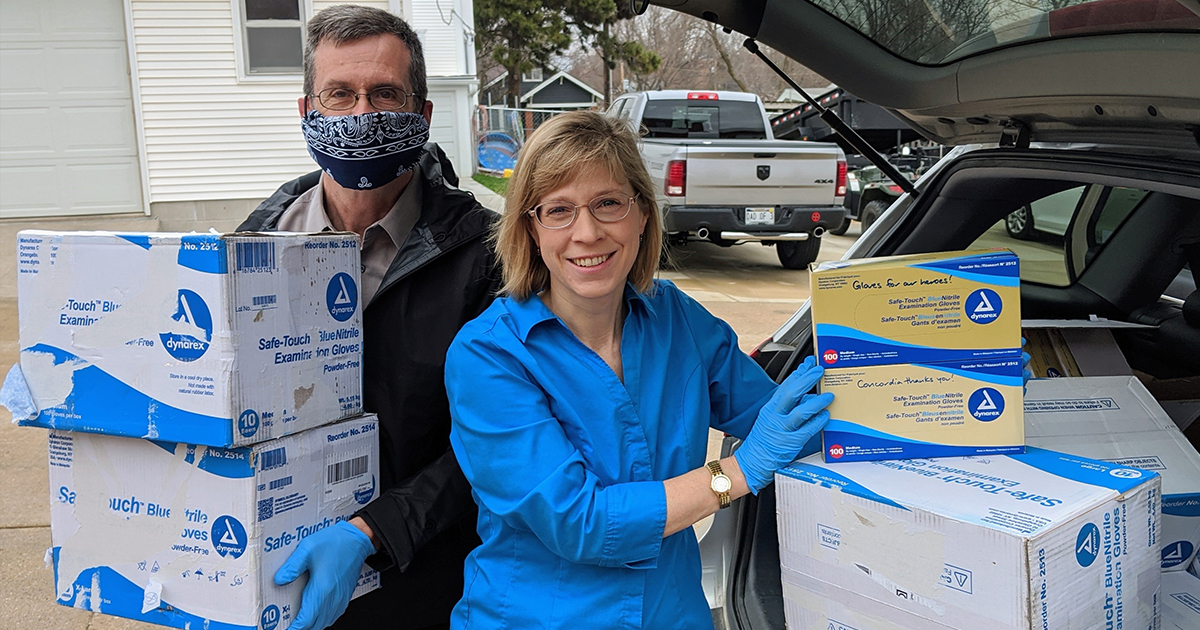
By Jayne E. Sheafer
During the COVID-19 shutdown, LCMS colleges and seminaries have had to rethink how best to serve students while following government-imposed safety mandates. But their efforts have extended beyond their own campuses as they have sought to serve those in need in the surrounding communities.
Concordia University Wisconsin, Mequon, Wis. (CUW), is assisting by printing N95-modeled respirator masks on 3D printers.
“We were hearing early on from the medical community that they needed the masks, and they needed them now,” said Dr. Dan Sem, dean of CUW’s Batterman School of Business. “Our goal was to get these N95 prototypes produced and delivered as quickly as possible to keep the medical professionals using them as safe as possible.”
Concordia’s Makerspace Lab has 30 3D printers currently engaged in printing prototypes. Within a 24-hour span, the lab can print upwards of 70 respirator masks under one design.
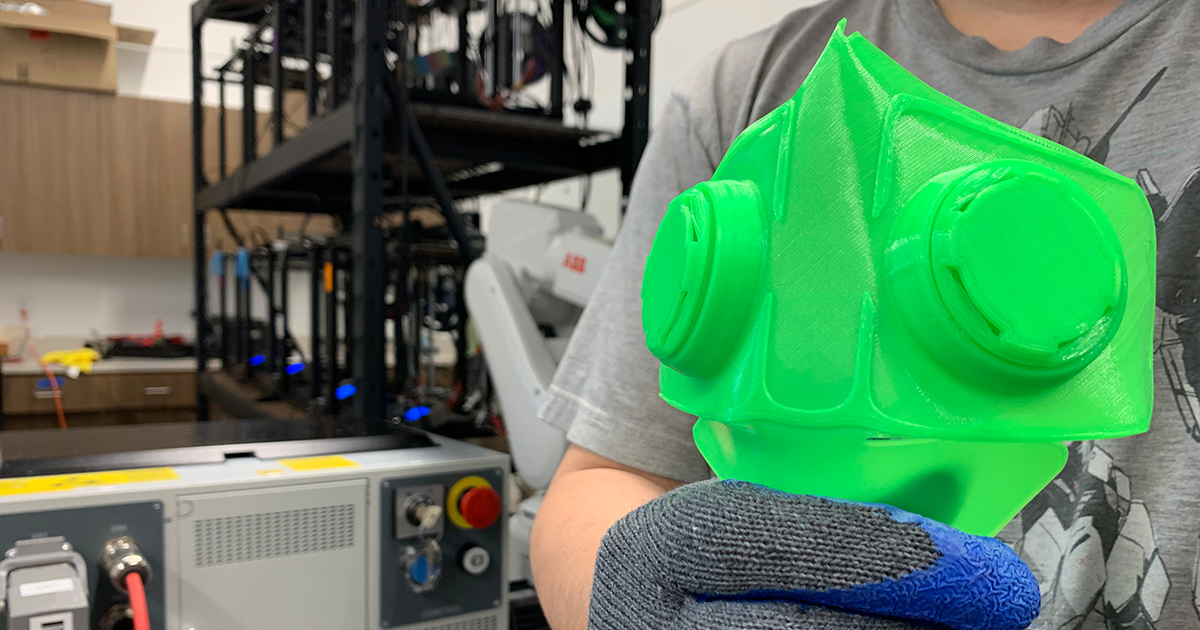
Other Concordia University System (CUS) schools are supporting their communities in a variety of ways:
- The Science, Nursing and Doctor of Physical Therapy programs and Student Life office at Concordia University, St. Paul, St. Paul, Minn. (CSP), donated all of their available masks, gloves, gowns and swabs to local medical facilities.
- The Science Department at Concordia University, Nebraska, Seward, Neb. (CUNE), donated and delivered 13,000 disposable gloves to the Memorial Health Care System in Seward.
- The School of Health Sciences and Nursing at Concordia College New York, Bronxville, N.Y. (CCNY), donated personal protective equipment to Wartburg, a senior care facility in Mount Vernon, N.Y. CCNY biology professor Dr. Molinda Kearns, who owns the Hudson Anchor restaurant in Sleepy Hollow, N.Y., has developed a program for people to donate meals to front-line responders (hospitals, health clinics, etc.) by ordering through the restaurant. Kearns delivers the meals and includes cards thanking the responders for their service.
- The Concordia University, Ann Arbor, Mich. (CUAA), Nursing Program gave personal protective equipment such as gloves, gowns and masks, along with bandages and thermometers, to CUAA alum Stanley Stinson (’19), who works with the homeless. Stinson is a member of Covenant Community Care, an organization that provides foot care, wound care and temperature checks to those living on the streets. CUAA also donated paper towels and toilet paper to Wolverine Human Services, which serves over 500 children in foster care, adoption or residential treatment services. “Luckily, we had stocked up on paper supplies for the spring semester before all of this started,” said Jerry Novak, director of CUAA’s buildings and grounds. “Without anyone on campus now for the weeks and months ahead, we have more than enough.” CUAA also gathered boxes of children’s books and craft supplies to give to those served by Wolverine Human Services.
- At Concordia University, Irvine, Calif. (CUI), biology students Hannah Hopkins (’20) and Anna Chao (’21) were recruited to travel to the University of Washington to help process COVID-19 tests. Both said they were grateful for the opportunity to serve and the support they received from their professors and families.
- Concordia University Texas, Austin, Texas (CTX), has opened two residence halls free of charge to first responders and healthcare workers supporting COVID-19 efforts. Uniformed personnel may reserve one of more than 125 single-occupancy rooms to rest between shifts and to minimize fear of exposing their own households to the virus. “The university feels privileged to support our local first responders as they work selflessly for our community,” said Kristin Coulter, vice-president of partnerships for CTX.
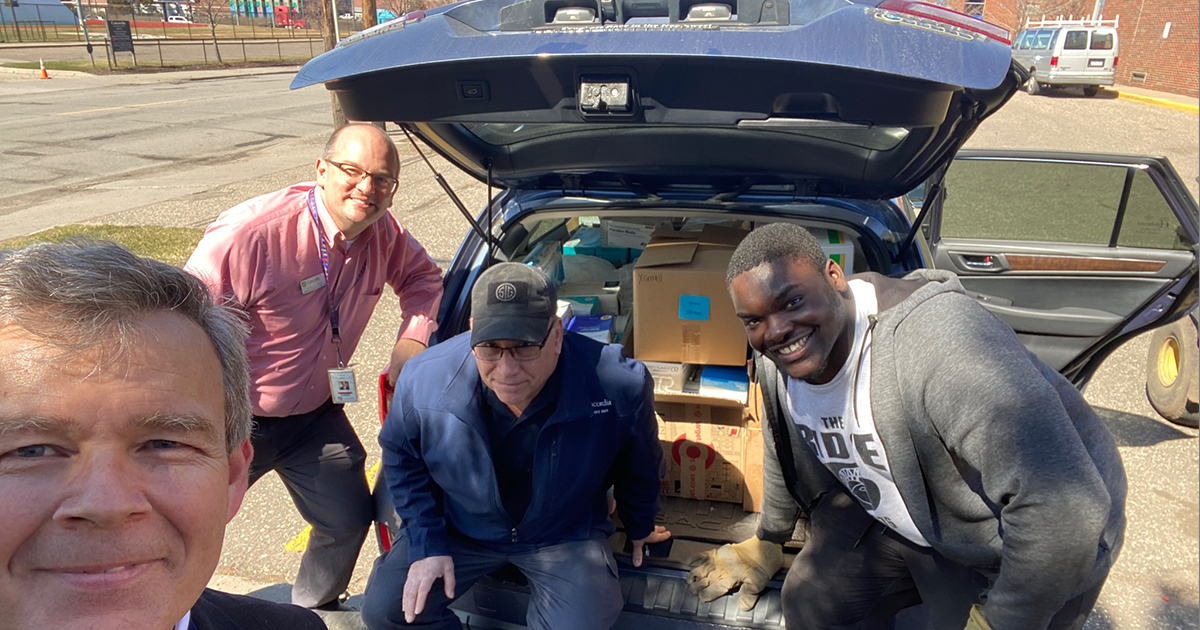
Distance learning
As campuses across the country have closed, classes at all CUS schools and at both LCMS seminaries are being held entirely online. Commencement plans needed to be revamped as well. Both Concordia Seminary, St. Louis (CSL), and Concordia Theological Seminary, Fort Wayne (CTSFW), are holding their call, vicarage assignment and deaconess assignment services online.
“While this is not the formation process we planned for our students, especially those who are coming to the end of their time with us, we trust in the God who knows all things and uses them for our good,” said CTSFW President Rev. Dr. Lawrence R. Rast Jr.
Each school has designed a webpage to keep its community informed (see list below). Dates and times for commencement services and timelines for reopening of campuses can be found at these sites.
With campuses closed, residential students had to move out of dorms.
“Faculty worked hard to … continue to deliver a high-quality Christian education — while being flexible and understanding of the realities of the COVID-19 crisis,” said Dr. Kristi Kirk, provost at CTX. “Academic support staff … continually asked questions about the needs of different types of students in the process.”
At Concordia University Chicago, River Forest, Ill., the Dean of Students Office coordinated faculty and staff volunteers to undertake a comprehensive campaign to reach out to more than 6,000 undergraduate and graduate students by phone. Volunteers talked with students to discuss their personal well-being, academic progress and any challenges they faced, providing guidance and additional resources as necessary.
“The presidents and campuses of the Concordia University System, while in very diverse settings … have acted swiftly to insure the welfare of their students with minimal interruption of their academic programs,” said the Rev. Dr. Dean O. Wenthe, CUS president. “Such a speedy, caring and thoughtful response to the coronavirus concretely exhibits the Christian spirit that characterizes [the CUS].”
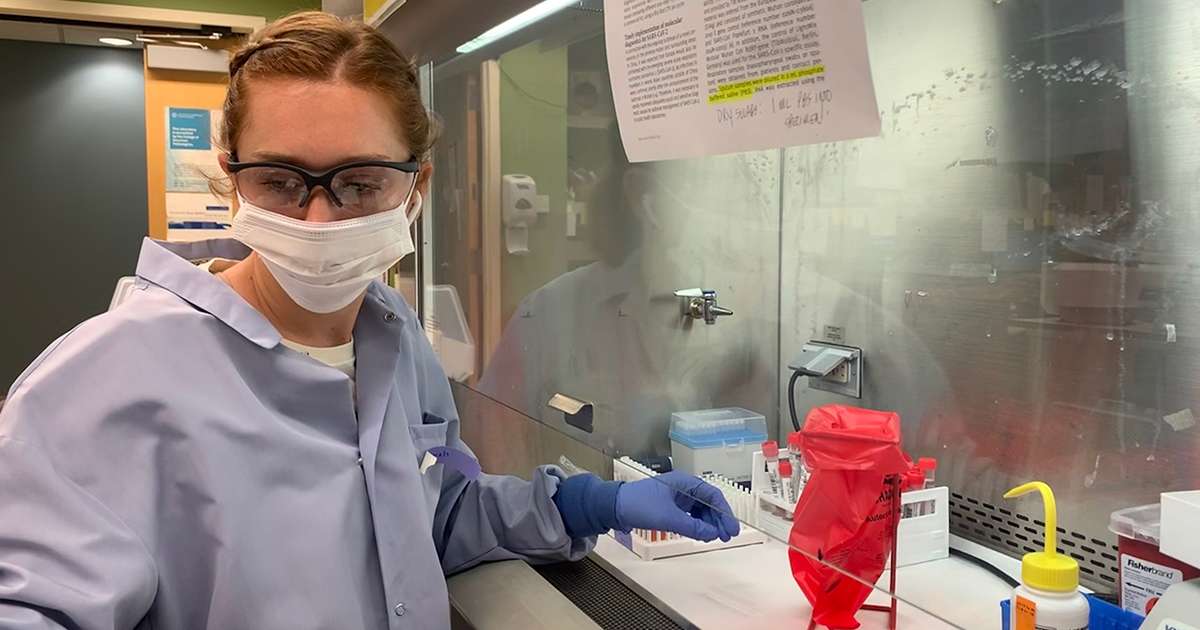
Staying connected in faith
A significant challenge is continuing to provide spiritual care during the pandemic. Technology and social media are important tools.
The Rev. Ryan Matthias, campus pastor at CUNE, livestreams his daily chapel message on Facebook and emails devotions to the campus community to help lift spirits.
“Sharing these devotions seems to [provide] a calming influence and … a bit of normalcy during all of this,” Matthias said. “Some have told me … it gives them a time to break up their day and refocus on the priority of the Gospel.”
At CUI, efforts from several corners of the campus have coalesced into the cui.edu/together website, where weekly video messages from CUI President Dr. Michael Thomas and daily devotional resources are posted.
DCE Shelly Schwalm, university ministry associate at CSP, said, “We take our role to offer the peace of Christ to our university community seriously as we prioritize spiritual care through chapel and other avenues.”
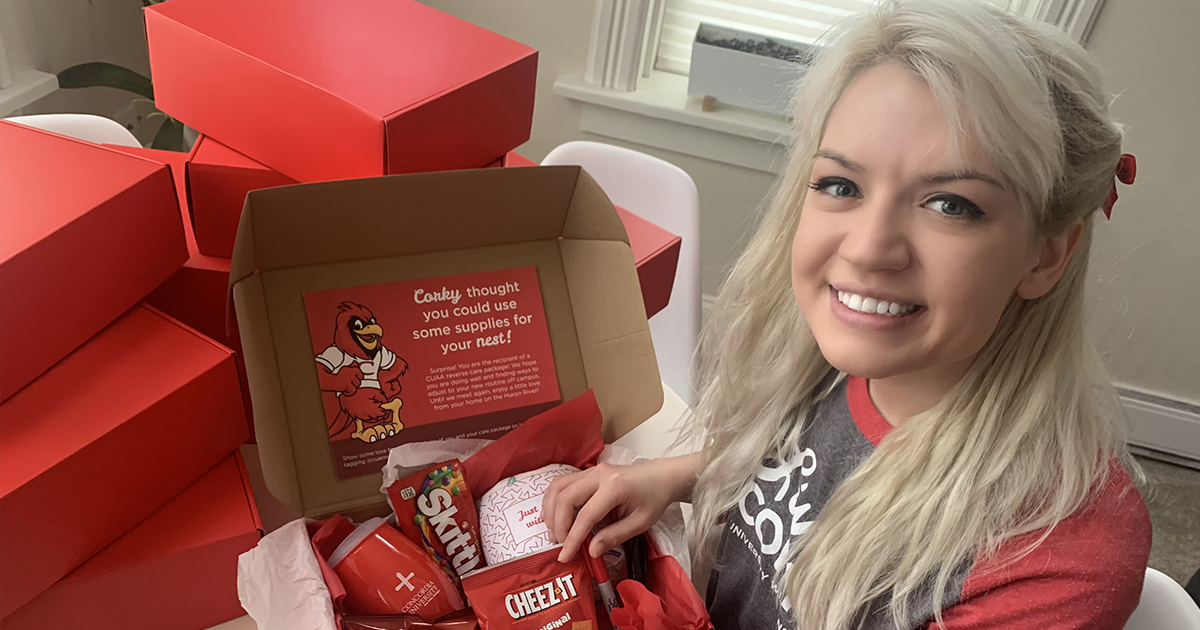
Care for mind and body
Abrupt changes such as those that have accompanied the COVID-19 crisis can affect mental health. Kathleen von Kampen, mental health counselor at CUNE, is hosting two online “hangouts” each week where students can get help coping with the pandemic.
At CSL, a Facebook group devoted to reading the Bible is helping wives of seminarians stay connected to God’s Word. In addition, CSL Women’s Coordinator Katie Nafzger and SMP Student Wives Coordinator Celina Haupt have been placing books from Concordia Publishing House on the steps of the chapel for women to pick up.
“Giving these books … allows us to connect with each other using God’s Word. So even though we can’t physically be present, we can read Scripture and then discuss and pray using a virtual format,” explained Nafzger.
“Our intention is to check in once a week. Hopefully, ladies will share their thoughts and insights, be encouraged, and feel closer to each other even as we keep our distance. It was really encouraging to see the volumes disappearing by the hour! I think everyone is pleased to have a tangible way to lean on God and each other,” added Haupt.
At CTSFW, local students are being served by a drive-by station at the Food & Clothing Co-op that allows them to pick up groceries, free of charge, while limiting contact.
“We packed 73 boxes with canned and dry goods, pork and fresh produce,” explained Deaconess Katherine Rittner, co-op director. “We also provided 10-pound rolls of ground beef, 80 gallons of milk, laundry detergent, as well as diapers and wipes to our families with infants.
“During these times of uncertainty, it is even more important that the co-op continue to care for our students and their families’ grocery needs.”
Remaining steadfast
The Synod’s institutions of higher learning will continually assess how they can best serve those in their communities — and beyond — during the pandemic.
“We deal with this crisis as faith leaders,” said the Rev. Dr. Dale A. Meyer, CSL president. “I treasure the practical advice another president told me about administration. ‘Accept chaos, give back calm, provide hope.’ As spiritual leaders, we trust the promises of our loving heavenly Father.”
Jayne E. Sheafer (sheafer88@gmail.com) is a writer and editor from Fort Wayne, Ind.
Get the latest COVID-19 updates
CUW: cuw.edu/covid19
CUAA: cuaa.edu/covid19
CUC: cuchicago.edu/coronavirus
CUI: cui.edu/covid19
CCNY: concordia-ny.edu/coronavirus-updates
CUNE: cune.edu/covid19
CSP: csp.edu/covid19
CSL: csl.edu/coronavirus-covid-19
CTSFW: ctsfw.edu/covid19response
Posted April 27, 2020




